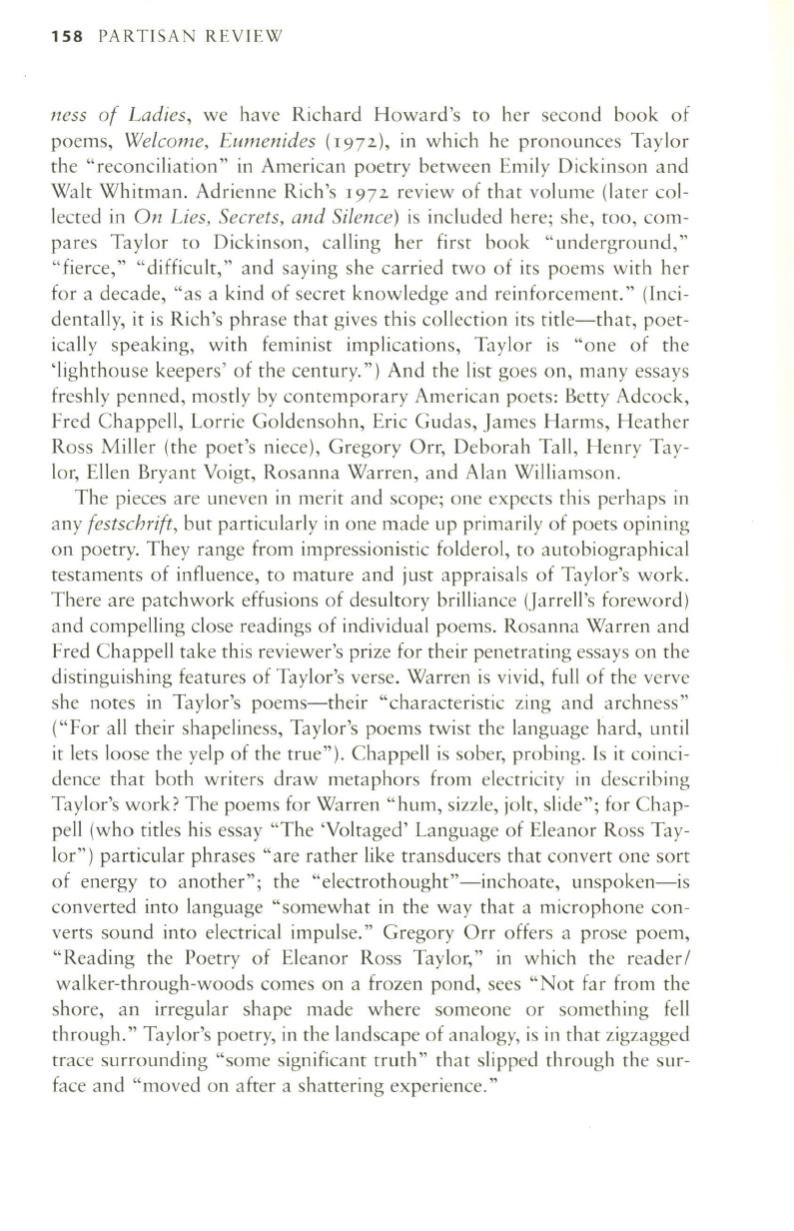
158
PARTISAN REVIEW
ness of Ladies,
we have Richard Howard's to her second book of
poems,
Welcome, Eumenides
(1972),
in which he pronounces Taylor
the "reconciliation" in American poetry between Emily Dickinson and
Walt Whitman. Adrienne Rich's
1972
review of that volume (later col–
lected in
On Lies, Secrets, and Silence)
is included here; she, too, com–
pares Taylor to Dickinson, calling her first book "underground,"
"fierce," "difficult," and saying she carried two of its poems with her
for a decade, "as a kind of secret knowledge and reinforcement." (Inci–
dentally, it is Rich's phrase that gives this collection its title-that, poet–
ically speaking, with feminist implications, Taylor is "one of the
'lighthouse keepers' of the century.") And the list goes on, many essays
freshly penned, mostly by contemporary American poets: Betty Adcock,
Fred Chappell, Lorrie Goldensohn, Eric Gudas, James Harms, Heather
Ross Miller (the poet's niece), Gregory Orr, Deborah Tall, Henry Tay–
lor, Ellen Bryant Voigt, Rosanna Warren, and Alan Williamson.
The pieces are uneven in merit and scope; one expects this perhaps in
any
festschrift,
but particularly in one made up primarily of poets opining
on poetry. They range from impressionistic folderol, to autobiographical
testaments of influence, to mature and just appraisals of Taylor's work.
There are patchwork effusions of desultory brilliance (Jarrell's foreword)
and compelling close readings of individual poems. Rosanna Warren and
Fred Chappell take this reviewer's prize for their penetrating essays on the
distinguishing features of Taylor's verse. Warren is vivid, full of the verve
she notes in Taylor's poems-their "characteristic zing and archness"
("For all their shapeliness, Taylor's poems twist the language hard, until
it lets loose the yelp of the true"). Chappell is sober, probing. Is it coinci–
dence that both writers draw metaphors from electricity in describing
Taylor's work? The poems for Warren "hum, sizzle, jolt, slide"; for Chap–
pell (who titles his essay "The 'Voltaged' Language of Eleanor Ross Tay–
lor") particular phrases "are rather like transducers that convert one sort
of energy to another"; the "electrothought"-inchoate, unspoken-is
converted into language "somewhat in the way that a microphone con–
verts sound into electrical impulse." Gregory Orr offers a prose poem,
"Reading the Poetry of Eleanor Ross Taylor," in which the reader/
walker-through-woods comes on a frozen pond, sees "Not far from the
shore, an irregular shape made where someone or something fell
through." Taylor's poetry, in the landscape of analogy, is in that zigzagged
trace surrounding "some significant truth" that slipped through the sur–
face and "moved on after a shattering experience."


